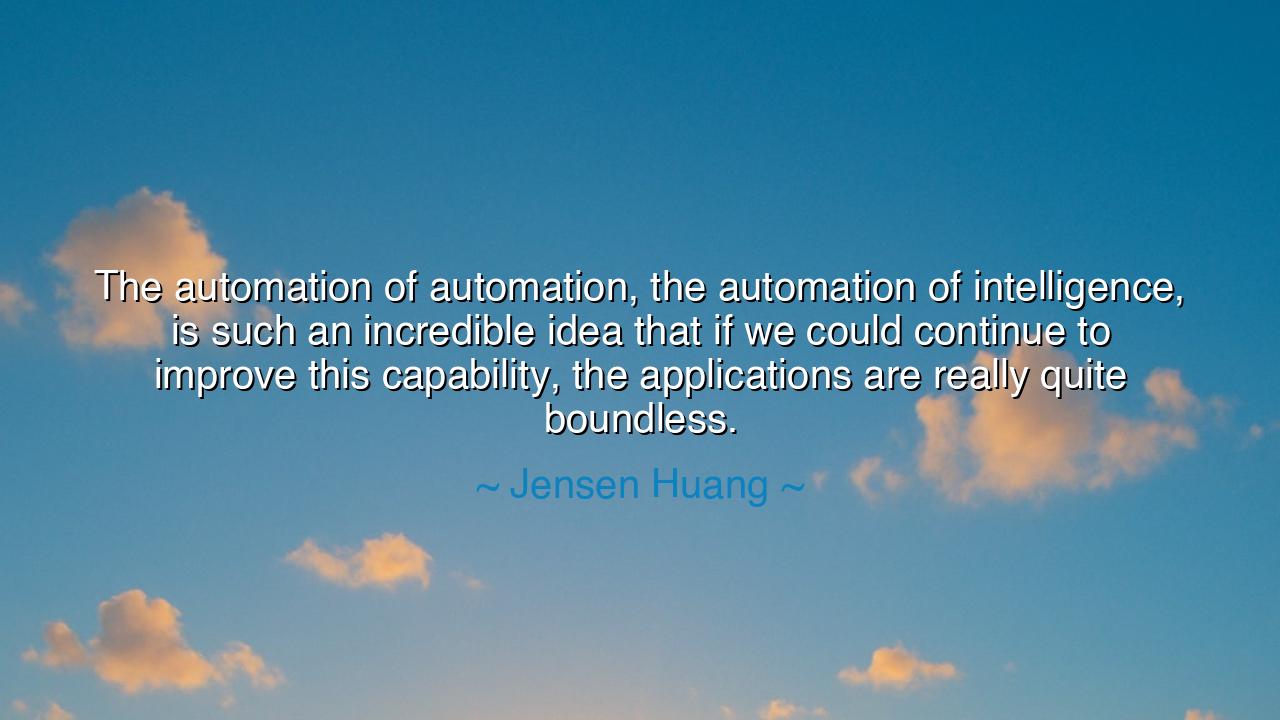
The automation of automation, the automation of intelligence, is
The automation of automation, the automation of intelligence, is such an incredible idea that if we could continue to improve this capability, the applications are really quite boundless.






In the visionary words of Jensen Huang, the founder of NVIDIA and one of the architects of our technological age, we hear the tremor of a new dawn: “The automation of automation, the automation of intelligence, is such an incredible idea that if we could continue to improve this capability, the applications are really quite boundless.” These are not the idle musings of an engineer, but the prophecy of a builder who has gazed into the heart of creation and seen machines learning to think — systems teaching themselves how to teach. In these words lies a reflection of humanity’s eternal quest to transcend limitation, to forge tools that amplify not merely our hands, but our minds.
The origin of this quote arises from Huang’s reflections on the evolution of artificial intelligence, particularly the power of machines that can improve themselves. For centuries, humankind has built instruments of labor — the wheel, the loom, the engine — but now we have crafted something far greater: tools that learn, that create, that adapt without direct command. To automate labor was one kind of revolution; to automate intelligence is another entirely. It is the birth of an age where the builder no longer needs to teach the machine each step, for the machine learns from its own experience. Huang, as one who pioneered the GPU and its transformation into the engine of modern AI, speaks from the frontier of this awakening — where technology begins to reflect the boundless adaptability of life itself.
To call this “the automation of intelligence” is to recognize a shift in the very nature of creation. Just as the ancients once looked upon fire as divine, so too may future generations look upon this moment — the time when intelligence ceased to be only human. Yet, Huang’s tone is not one of fear, but of awe. He sees this power not as the replacement of man, but as his extension, as though the human mind, reaching outward, had found new hands in the circuitry of the machine. To him, this “automation of automation” is not a surrender of agency, but an expansion of possibility — a way for humanity to explore realms once thought unreachable: medicine, art, language, and the deep structure of the cosmos itself.
Consider the story of Alan Turing, who during the dark years of the Second World War built a machine that could think, in its primitive way, faster than any man alive. From that spark — a device that could compute logic — arose a lineage that would, decades later, give birth to artificial intelligence. But even Turing could scarcely have imagined a time when machines would not only perform logic but generate understanding, not only calculate outcomes but invent new paths toward them. What began as the automation of calculation has become the automation of creation. This is the evolution Huang speaks of — the transformation of humanity’s tools into collaborators of thought.
Yet in this brilliance, there is a sacred warning. For as the ancients knew, fire both warms and burns, and the greater the gift, the greater the responsibility to wield it wisely. Huang’s awe carries the weight of stewardship — a call to use this boundless power not for conquest, but for cultivation. To automate intelligence is to amplify the soul of civilization itself; therefore, we must guide that soul with wisdom. The machine, magnificent as it may be, reflects the heart of its maker. If that heart seeks understanding, the world will prosper; if it seeks only dominion, the creation may one day devour the creator.
Thus, this quote is not only about technology — it is about human potential. It tells us that invention, like intelligence, is an infinite river. When we dare to improve upon improvement, when we refine not only the tool but the process of refining, we touch the edge of infinity. This is the essence of progress: each discovery births another, each automation opens the door to a deeper mystery. Huang’s words invite us not merely to build, but to imagine without boundary — to see that the true power of creation lies not in what we automate, but in how we evolve alongside it.
Therefore, O seeker of understanding, take this lesson to heart: do not fear the machine — learn from it. Let your curiosity grow as your tools grow; let your humanity deepen as your technology expands. Remember that intelligence, whether biological or artificial, is most noble when guided by purpose. Strive, as Huang has, to make your inventions extensions of compassion and creativity, not replacements for them. For in the end, the “automation of intelligence” is not merely the evolution of machines — it is the next expression of the human spirit itself, reaching once again for the stars.
And if we dare, with wisdom and humility, to continue this journey, then truly — as Huang proclaimed — the applications are boundless, for the limit of our creation is nothing less than the limit of our dreams.






AAdministratorAdministrator
Welcome, honored guests. Please leave a comment, we will respond soon